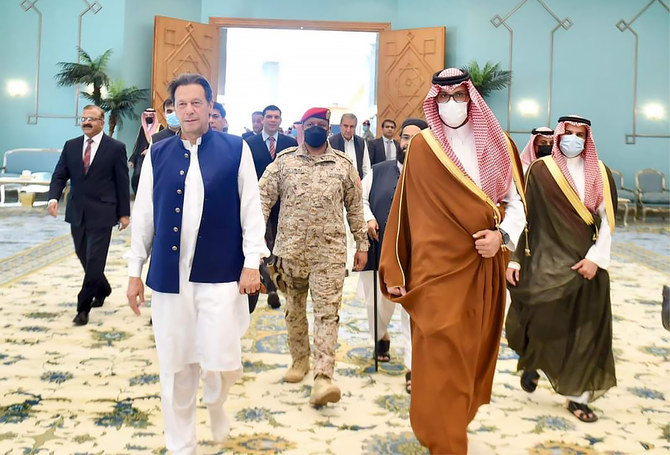ISLAMABAD: Pakistani Prime Minister Imran Khan on Saturday arrived in Saudi Arabia on a three-day visit at the invitation of Crown Prince Mohammed bin Salman and was received by Deputy Governor of Madinah Prince Saud bin Khalid Al-Faisal, announced the PM Office in a Twitter post.
This is Khan’s second visit to Saudi Arabia this year. He visited the kingdom last in May and signed several agreements.
“Prime Minister @ImranKhanPTI arrives in Madina on 3-day official visit to Saudi Arabia,” the Prime Minister’s Office said in a social media post with Khan’s pictures in the kingdom. “The PM was received by Deputy Govenor of Madinah Prince Saud bin Khalid Al-Faisal, and was given a warm reception.”
According to Pakistan’s state-run APP news agency, the prime minister will attend the “inaugural ceremony of the ‘Middle East Green Initiative (MGI) Summit’ being held in Riyadh” on Monday.
“The first of their kind in the Middle East Region, ‘Green Saudi Arabia’ and ‘Green Middle East’ initiatives were launched by the Crown Prince in March 2021 aimed at protecting the nature and planet,” it added.
Foreign Minister Shah Mahmood Qureshi, Energy Minister Hammad Azhar and the PM’s Special Assistant on Climate Change Malik Amin Aslam are accompanying the prime minister.
At the MGI summit, Khan will speak about challenges faced by developing countries due to climate change and highlight Pakistan’s experience of launching nature-based solutions to address environmental concerns, including the 10 Billion Tree Tsunami tree planation project, a flagship of his government.
“Besides meeting the Saudi leadership, the prime minister will also participate in an event on the promotion of investment in Pakistan and interact with leading investors and businessmen from Saudi Arabia and Pakistani diaspora,” APP said.
On Saturday, the crown prince of Saudi Arabia said the world’s top oil exporter aimed to reach zero-net emissions by 2060 and more than doubled its annual target to reduce carbon emissions to almost 280 million tons.
Crown Prince Mohammed bin Salman was speaking in recorded remarks at the Saudi Green Initiative, which comes ahead of the 26th UN Climate Change Conference of the Parties, or COP26, in Glasgow from Oct. 31 — Nov. 12, that hopes to agree on deeper emissions cuts to tackle global warming.
Riyadh, a signatory to the Paris climate pact, on Saturday set out details of its nationally determined contributions (NDCs) — goals for individual states under global efforts to prevent average global temperatures from rising beyond 1.5 degrees Celsius above pre-industrial levels.
The United States and the EU want Saudi Arabia to join a global initiative on slashing emissions of methane by 30 percent from 2020 levels by 2030.
US climate envoy John Kerry will also attend the wider Middle East green summit Riyadh is hosting on Monday.
















